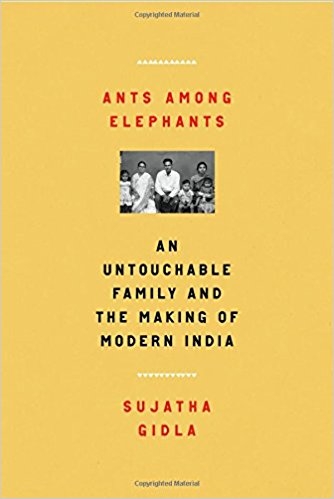“Why are you an Untouchable?” I asked Sujatha Gidla, panelist and author at the Brooklyn Book Festival. Petite, deep brown skin, jet-black hair pulled back in a pony tail with a stray curl adorning her sweet face, Sujatha of Indian descent (as in India), shared the panel with Pulitzer Prize winner, Hisham Matar. The panel had opened the floor to Q&A after a deeply moving discussion on ‘The Art of Family Stories.’
Sujatha, born in India, grew up in a culture where the Hindu caste-system had placed her at the bottom of the rung—actually, below the rung. She was a Dalit, the lowest caste, an ‘untouchable.’ She couldn’t drink from the same water fountain as others, couldn’t enter a temple, had to live in a segregated community for ‘untouchables only,’ trapped by birth for life, cast away by the caste system, and confined to the profession of sweepers and bathroom cleaners. And since Dalits did work that was considered filthy, they were considered dirty, and therefore, other than an untouchable, no one could touch her. I know from personal experience that if any Hindu accidentally touched an untouchable, he or she would then wash their hands and go through a ritual purification.
I had never known a Dalit, or if I did, I didn’t know or care to know the person’s caste. So here I am, listening to a Dalit tell her family story. She lived in Kazipat in the southern Telangana state in India. Ancient prejudices endured, and she and her family were relegated to a life of humiliation and segregation. Through the help of missionaries, she got herself an education, studied physics, and at age 26, made her way to the United States. She now works as a subway conductor in NYC. One day, she decided to write a book about her family’s story, by having long conversations with her mother.
“I wrote this book because I wanted to find out why I am an untouchable?”
“Did you find the answer to your question…? I raised my hand and asked.
“Yes. I did.”
I leaned forward.
“Its economics.” Sujatha explained that those who controlled the economy, needed a labor class; people to do the work no one else wanted to do, at wages no one wanted to work for. They had a vested interest in preventing the labor class from land ownership, to keep them dependent and impoverished. It was all about control and enriching the rich.
Why are we not surprised!
Khalid asked her about her children, born and raised in the U.S. Do they feel at the fringes of society or do they feel integrated?
Sujatha’s response: Her children are integrated into mainstream, but feel a disconnect with the local Indian community, because they are untouchables. When she wrote her book, exposing her pain and humiliation, her children and nieces did not want the Indian community in the U.S. to know about the book. They were afraid that they would be cast out or ostracized. Likewise, people in India are angry over her memoir, their linen having been aired.
As the moderator thanked the panel, a woman sitting next to me spoke up (to me). “Do you know why men claimed that a woman’s place is in the home? Because they wanted them to do the work of cleaning and cooking for them, so that they could go out and make money, and control women. It’s the same idea.”
Khalid and I rushed over to Sujatha, shook her hand, introduced ourselves.
“Thank you for asking the questions. Did I answer them ok?” A celebrity, modest at heart.
“Maybe I will see you on the NYC subway.” I said. I hope I do. She is so touchable.
For now, I plan to curl up with her book, Ants Among Elephants.
******************************








